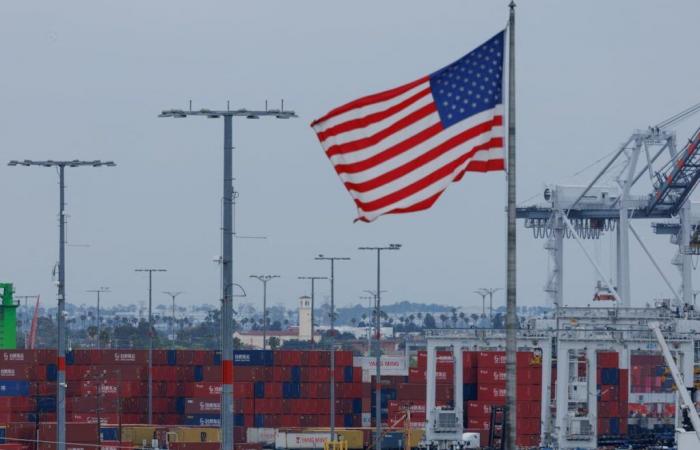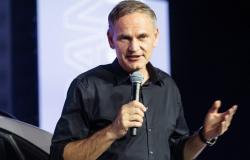The president of the United States, Donald Trump, raises the commercial war as a way of protecting the US industry from foreign competition. Tariffs, however, are fully affecting the results accounts of their own companies. Dozens of large multi -sectors American companies have alerted in their presentations of the first quarter of the impact they will suffer with Trump’s new commercial policy.
The bundle to the results of the companies arrives, mainly, through two roads. On the one hand, there is the direct effect on those that have a global supply chain, with imports from countries whose goods are subject to new levies. On the other, there is the effect of uncertainty and loss of confidence, which translates into a brake of consumer spending and the economy in general.
Berkshire Hathaway, who presented his results on Saturday, coinciding with the Board of Shareholders in which Warren Buffett announced his withdrawal as CEO after six decades, warned about the “considerable uncertainty” that the commercial war had introduced. The group, a conglomerate with companies in numerous sectors, warned in its quarterly report of the potential impact through changes in products costs, the efficiency of the supply chain or the demand of their products and services by customers. “It is reasonably possible that adverse consequences occur in the majority, if not in the totality, of our operational activities, as well as in our investments in variable income values,” he said.
Around three out of four companies have referred to tariffs in their results presentations. The most drastic reduction of forecasts has been made by General Motors, although Trump has been patching again and again the tariffs that punish the automobile sector to try to reduce the impact. The Detroit giant warned last week of an impact of 4,000 to 5,000 million dollars in its accounts this year. The company reduced its net forecast of the range of 11,200 to 12.5 billion dollars until it is left at 8,200-10.1 billion. In the case of the exploitation result, the fork is passed 13,700-15.7 billion dollars to that of 10,000-12,500 million. Ford, on the other hand, withdrew its annual forecasts on Monday after admitting an impact of 1.5 billion dollars on its exploitation result, despite taking measures to mitigate another 1,000 million.
Trump wants companies to transfer production from abroad to the United States, but they have noticed that they cannot do it overnight. He referred to the transitory relief granted to the automobile sector in these terms: “We have given them a little time before slaughtering them if they do not.”
The president also gave special treatment to the importation of telephones, computers and tablets from China. Although these products are exempt from 125%reciprocal tariffs, Apple calculated that in the second quarter the impact of the measures that are in force will mean an overrun of about 900 million dollars in the second quarter. His CEO, Tim Cook, implied that the impact could be greater in successive quarters.
Amazon said that his future results could be affected by “tariff and commercial policies”, which did not mention the previous quarter. “Obviously, none of us knows exactly where tariffs or when,” said Andy Jassy, president and CEO, at the conference with analysts.
Among the companies that have quantified the direct impact of the tariffs are also Colgate-Palmolive. The manufacturer of hygiene and cleaning products, with brands such as Colgate, Sanex, Palmolive and Ajax, estimates that tariffs will raise their gross costs in 200 million dollars and that will have inflationary effects, which can displace demand towards white brand products. Without contributing a specific figure, Procter & Gamble said that it even raises its products to try to mitigate the costs of costs (and price increases) derived from the new tariffs, while reduced its sales forecasts between 1,700 and 3,400 million for the year. Chlorox also reduced its growth forecasts on Monday.
Pepsico, meanwhile, reduced its forecasts for benefits for the whole year because of uncertainty, the increase in costs in the supply chain and the signals of weakening consumption. McDonald’s, meanwhile, already suffered in the first quarter the greatest fall in sales from the pandemic, in the midst of an increasing distrust of consumers about the economy and fear of recession.
Among the companies that are suffering most of the effects of economic cooling are those of travel. Consumers prefer to postpone their plans waiting to see how events evolve. Airbnb and Booking referred to the greatest economic uncertainty by publishing forecasts that disappointed the market. American Airlines and Delta Air Lines airlines have withdrawn their forecasts by 2025 alleging the uncertainty derived from Trump’s commercial policies, while Southwest Airlines and United Airlines are braking their growth plans in anticipating a lower demand for national trips per leisure.
Many other companies have warned of the risks involved in American commercial policy. But there is also some that have won. The chief of the Siderúrgica Nucor, Leon Topalian, He was optimistic with demand after 25% tariffs imposed on aluminum and steel of their foreign competitors.






